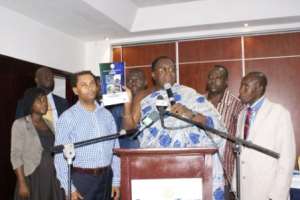
A regional investment gateway project has been launched in Kumasi to establish Suame Magazine as the West African Sub-regional hub in artisanal engineering.
The 100-paged investment policy blueprint embodies a medium term industrial development plan towards industrialization by 2016.
The project is under the second phase of an industrial development roadmap to promote local-content investment and policy for the industrialization of Suame Magazine, the largest artisanal engineering enclave in West Africa.
The major intervention is to mobilize resource to build a modern industrial complex on a 1000 acre land strategically located close to the present artisanal engineering cluster.
According to Nyaaba-Aweeba Azongo, author of the blueprint and Consultant to the Suame Magazine Industrial Development Organization (SMIDO), “the regional investment gateway branding is to afford the opportunity to develop Suame Magazine as the major investment conduit to the West African market to reach out to the rest of the sub-regional blocks in Africa with its own unique brand of innovative engineering products.”
Suame Magazine is the economic stranglehold of Ashanti region with an estimated livelihood support to a population of over 1.3million. The Magazine, with its expertise in vehicular repairs and maintenance, also has a market jurisdiction of over 250 million population across the entire West African sub-region with footnotes in the North-African region.
The current market outlook in West Africa indicates that Burkina Faso is currently Suame Magazine's leading market with a significant market performing rate of 32% followed by Niger, Cote d'Ivoire, Mali, Togo and Nigeria with market rates of 15%, 14%, 13%, 11% and 10% respectively.
“Ghana is lagging behind because of lack of industrialization and that is the essence of SMIDO and of the Suame Magazine; these are wheels of industrialization which the government and the people of this country must support,” noted the Akyeampimhene, Oheneba Aduse-Poku.
The first phase of the SMIDO project started in 2006 under the USAID-DANIDA-DFID sponsored Business Sector Advocacy Challenge (BUSAC) Fund to determine an industrial development roadmap to develop Suame Magazine into a modern industrial estate.
Successes chalked under the phase include the design and outdoor of a prototype vehicle dubbed “SMATI Turtle” with international partners to evolve a Ghanaian automobile brand, as well as the establishment of the Suame Magazine Industrial Development Fund (SMID FUND) as an avenue for artisans to acquire industrial plots for operations and access to a comprehensive one-stop-shop financial cover for a secured business and enterprise competitiveness.
“The second phase of the industrialization agenda is to mobilize resources through a local content investment strategy and local content industry integration policy within the framework of a tripartite partnership model of Industry-Academia-Government to administer the development of the Roadmap towards industrialization,” said Mr. Azongo.
SMIDO has developed an industry-led institutional training centre – the Suame Magazine Automatics Technical Institute (SMATI) – which has entered into a partnership with the Kwame Nkrumah University of Science and Technology (KNUST) to establish a unit of artisanal engineering under the College of Engineering for the training, assessment and certification of artisanal engineers in the country.
The Ghana Chamber of Mines has also pledged its support to SMIDO in enhancing the value of Ghana's industrial sector.
“The Chamber will support the artisans in Suame to acquire the competency that is needed to function effectively and meaningfully in the mining sector through the provision of capacity building programmes,” stated Dr. Toni Aubynn, Chief Executive of the Chamber.
According to Mr. Azongo, Suame Magazine could be adopted as a model to promote an equity-based local content policy in the mining, oil and gas industry for the entire artisanal engineering industry in the country as a primary vehicle to propel economic development.
“It is important to factor industry-based characteristics in the Mining, Oil and Gas Industry to ensure a more equity-based local content driven economic development. The labour-intensive industrial sectors must be given special privileges if local content policy is to promote equity in economic development,” he said.
SMIDO President, Sarpong Boateng, has appealed to the government to reconsider the provision in the 2010 Budget Statement on Suame Magazine in this year's budget to support the SMATI project.
Story by Kofi Adu Domfeh




 Lay KPMG audit report on SML-GRA contract before Parliament – Isaac Adongo tells...
Lay KPMG audit report on SML-GRA contract before Parliament – Isaac Adongo tells...
 Supervisor remanded for stabbing businessman with broken bottle and screwdriver
Supervisor remanded for stabbing businessman with broken bottle and screwdriver
 NDC watching EC and NPP closely on Returning Officer recruitment — Omane Boamah
NDC watching EC and NPP closely on Returning Officer recruitment — Omane Boamah
 Your decision to contest for president again is pathetic – Annoh-Dompreh blasts ...
Your decision to contest for president again is pathetic – Annoh-Dompreh blasts ...
 Election 2024: Security agencies ready to keep peace and secure the country — IG...
Election 2024: Security agencies ready to keep peace and secure the country — IG...
 People no longer place value in public basic schools; new uniforms, painting wil...
People no longer place value in public basic schools; new uniforms, painting wil...
 'Comedian' Paul Adom Otchere needs help – Sulemana Braimah
'Comedian' Paul Adom Otchere needs help – Sulemana Braimah
 Ejisu by-election: Only 33% of voters can be swayed by inducement — Global InfoA...
Ejisu by-election: Only 33% of voters can be swayed by inducement — Global InfoA...
 Minority will expose the beneficial owners of SML, recover funds paid to company...
Minority will expose the beneficial owners of SML, recover funds paid to company...
 Prof. Opoku-Agyemang has ‘decapitated’ the NPP’s strategies; don’t take them ser...
Prof. Opoku-Agyemang has ‘decapitated’ the NPP’s strategies; don’t take them ser...
